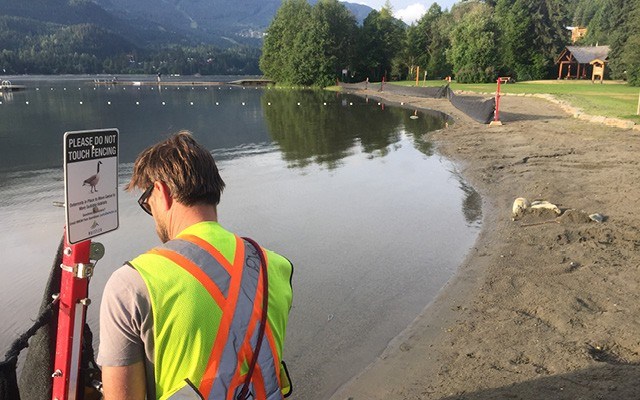As opposed to municipalities around the continent that cull pestilential non-migratory Canada geese, The Resort Municipality of Whistler's approach is to have an "acceptable" goose population, where numbers neither significantly impact the environment nor expose humans to high levels of health hazards like coliform bacteria and swimmer's itch.
Now into its fourth year, Whistler's goose management program began with one man: patroller Ian Bunbury and his avie dog. This summer is the second season that also sees deterrent fences in operation. Along with those barriers came Simon Westwood and his dog Betty, a small, black three-year-old whose terrier-like looks belie a labradoodle heritage. But her disposition, intelligence and obedience are all pure 'doodle. The pair's special bond goes beyond Simon's pocketful of treats, and watching them work together is heartwarming. Other people think so, too, as there seems no end to the parade of people who approach to chat as I accompany Simon and Betty on their morning rounds of Whistler's parks.
As we had the night before (see www.piquenewsmagazine.com, July 27, for Part 1), we begin at Rainbow, where tendrils of mist trail from the water. Early-morning swimmers in wetsuits haul out like seals on the dog dock, where a father teaches his son the fine art of fly-fishing. A nearshore flock of geese starts away as we approach. Were they waiting for us? Spooked by the swimmers or fisherman? There are goose tracks on the beach, but other than the same three green turds we saw here last night, no new poop, so they wouldn't have been here long.
Around 40 to 50 geese call Alta Lake home, while Alpha Lake's number hovers in the mid-30s. Geese aren't a problem at Lost Lake, perhaps due to more predators, and Green Lake has no public parkland. Rainbow is the Goose Busters's biggest challenge, but things have improved, according to Simon. "Fewer geese are coming ashore, so there's less poop to clean up. Last year we'd fill two to three restaurant buckets a day, like 30 kilos, but now one bucket is a big day."
Simon levels binoculars to follow the geese that have ducked behind an anchored sailboat. "Geese would tend to cross the lake to the Adventures West condo complex after we hazed them out of Rainbow," he says. "But now they have their own fences."
Simon sets about reeling in his. This involves unclipping one end of the fence then drawing it like a curtain across a tight steel cable. Once he secures a section at one end, I release the cable at the other and Simon winches it in with a drill. We do this six times. When we reach the seventh section, at the dog dock, the scene changes drastically, the mystery of where the geese spent the night solved. The dock is covered in massive piles of goose shit. There's also plenty of diarrhea and puke suggesting not-so-good health among some of the birds. It is, in a word, disgusting, and cringe-worthy watching the fishermen and swimmers step gingerly around it. "It's pretty much like this every day," says Simon, as he scoops up the mess that exemplifies a main reason for the RMOW's goose patrol.
The isolation of the muddle is because the dog dock is particularly low, and easy for geese to climb out on, while nearby swim rafts that the muni raised higher out of the water are spotless. We find similarly high docks at The Point Sailing Centre, on which Simon never sees poop. With binoculars he again scans the lake for geese. The flock we chased off earlier from Rainbow are hovering off Adventures West. Simon pulls out some spray paint to re-delineate a long-term poop study plot on the lawn, then we head to Alpha Lake Park.
Betty, clearly excited, tears off into the park. Disappointingly (for her) the geese are gone, but there's evidence of a poop party on the beach side of the fence and along a walkway. After we pull in the fences, I volunteer to scoop up the turds, which are here black instead of green — evidence of a slightly different diet, according to the affable Simon.
Not only does goose patrol require good dog skills and plenty of patience, but a friendly disposition, since talking to people about what you're doing — de facto outreach and education for the RMOW — occupies a lot of time. After four days on, Simon will trade off for the weekend with another handler and dog. In addition, a dozen volunteer human-dog teams registered to the program are scheduled through a private Facebook group. In order to join, dogs go through a training course and must be evaluated (if you're interested, email stewardship@whistler.ca). Dogs that are too aggressive don't make the cut. A good goose dog must have excellent recall response to their handler and be under control at all times; potential distractions include other wildlife, people and the scourge of unleashed dogs (particularly in early mornings), which frequently interfere by tearing into the scene while Simon and Betty are trying to do their thing.
Regardless, the late-night and early morning work of the Goose Busters in Whistler's lake parks is making a difference, rendering all of them more pleasant places to be.
Leslie Anthony is a Whistler-based author, editor, biologist and bon vivant who has never met a mountain he didn't like.




